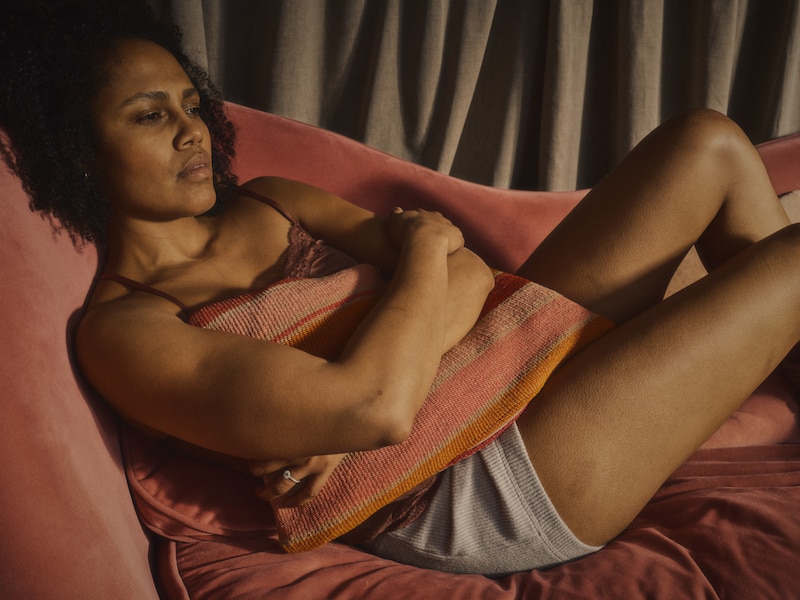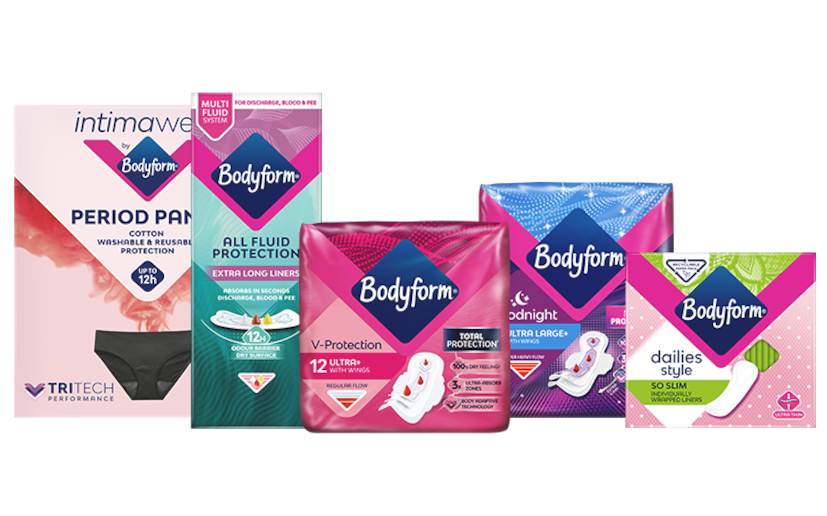How to get rid of period cramps at night

Period cramps keeping you from getting a good night's sleep? Don't worry, you're not alone! While some of us may not experience any symptoms, others may suffer from unbearable pain. But fear not, fellow sleep enthusiasts! We've got expert tips and tricks to beat period cramps, so nothing can come between you and your well-deserved rest.
Women+ lose around 5 months of sleep due to periods over their lifetime [1] and in many cases, menstrual cramps are the main culprit. Most of us have been there – lying in bed unable to catch any sleep, not because we’re excited for the next day, but because our uterus is keeping us up.
We hardly manage to get up in the morning, only to go about our business and repeat the tiresome cycle later again. Some of us may end up searching our cupboards in the middle of the night for painkillers or reaching for a hot water bottle, while others might give up on rest altogether.
Period cramps may never sleep, but why shouldn’t we? While you can't completely prevent the pain, there are a few things you can do to manage it. Read on to discover some helpful tips and tricks (including the best sleeping positions) you can try to help you get rid of that pesky period pain at night.
Did you know?
What can I do to stop period cramps at night?
Everybody deserves a good night’s sleep, and this shouldn’t change when we are on our period. Here are some tips to add to your night-time routine to keep cramps from turning your dreams into nightmares.
Hug a hot water bottle
If you want to get rid of your period cramps fast while in bed, then reaching for a hot water bottle might be a good idea. [3] Not only does the heat improve blood flow to your uterus, it also helps loosen and relax your muscles. This can reduce cramps and promote a better night’s sleep.
You can even press the hot water bottle between your body and the waistband of your pyjamas to keep it from falling off. Just remember to screw on the cap tightly and remove the hot water bottle before you drift off to sleep to prevent any burns or accidents from happening.
Check your room temperature
Another way to help relieve menstrual cramps at night is by checking that your room temperature is ideal for sleeping. Due to hormonal changes during our menstrual cycle, we may experience hot flushes and cramping that cause us discomfort, especially when we’re trying to sleep. [6] No wonder so many of us end up kicking our duvets off in frustration!
That’s one way to deal with it, but you may also want to open a window to let some fresh air cool you down before bed. Alternatively, you could try turning on a fan or having a cold shower. Whatever you do, feeling cool and comfortable may help you sleep better and feel more refreshed in the morning.
Give your tummy a massage
Massage can be a very effective way to help reduce muscular tension. Try massaging your lower back muscles and abdominal area with gentle movement from your thumbs before going to bed. [4] Doing this for a few minutes may help reduce the spasms in your uterus by allowing your muscles to relax. And that’s it – goodnight, cramps!
Have an orgasm
Did you know that having an orgasm helps relieve pain naturally, even period cramps?
That's because when you orgasm, your body releases all kinds of feel-good chemicals, like endorphins and oxytocin. When they’re released, they can take the edge off your cramps and make you feel more relaxed. [5]
So, why not suggest period sex to your partner next time you’re having menstrual cramps, or even masturbate? Whatever suits your fancy! Basically, you’ll get the best of all the things you can have in bed — pleasure and peaceful sleep.
What’s the best sleeping position to avoid period cramps?
There’s no one single sleeping position that will keep cramps at bay, so the best way to find relief is to experiment. We’ve put together some sleeping positions that you can try to help you get comfy and cope with your period pain at night.
The foetal position
The secret against nightly period pain is that the less strain there is on your abdomen, the less pain and cramping you’ll experience. Sleeping in the foetal position is perfect for this as it reduces pressure on your uterus and abdominal muscles. Nothing more comforting than feeling like a baby in the womb again!
Getting into this position is super easy:
- Lie on your side.
- Cuddle your knees up to your chest.
Pro tip – Switch up this sleeping position by placing a pillow between your knees for extra support. [6]
The recovery position
While helpful as a first-aid measure, the recovery position can also come to the rescue on your period nights.
To get into the recovery position:
- Rest on your side.
- Keep your bottom leg straight.
- Tuck your top leg in towards your belly.
Not only will this position relieve some of the strain on your abdominal area, but it will also support your breathing, resulting in a better night's sleep overall. [6]
Child’s pose
If you’re into yoga, you might be familiar with child’s pose – but did you know that sleeping in this position can be used to relieve menstrual cramps?
If you haven’t heard of child’s pose before, no worries, it’s super easy to get into! All you need to do is:
- Sit on your knees.
- Lean forward.
- Keep your buttocks on your heels.
- Rest your head on a pillow.
If you can’t keep this position all night, doing it before going to sleep or as part of your exercise routine during your period days can help relieve period cramps, making a huge difference in the quality of your sleep.
When should I see a doctor about my period cramps?
Most of us experience period cramps at one point or another – it's all part of living with periods! And while they can be annoying (and disturb our sleep), they’re usually not harmful to our health.
However, if you experience severe menstrual cramps that last more than 2 or 3 days, you may want to see your doctor. They will be able to recommend other ways to relieve the pain and give you some reassurance and support to put your mind at ease. Remember that you know your body best and if something doesn’t feel right, it’s worth reaching out for help so you can feel better.
If you’d like to continue learning, find out why it’s so hard to sleep on your period and how to manage night-time leaks.
Medical disclaimer
The medical information in this article is provided as an information resource only, and is not to be used or relied on for any diagnostic or treatment purposes. Please consult your doctor for guidance about a specific medical condition.
[References]
source-1[1] Join our quest for sleep | Bodyform
source-2[2] Period Sleep Omnibus. March 2018
source-3[3] Lee KA, Shaver JF, Giblin EC, Woods NF. Sleep patterns related to menstrual cycle phase and premenstrual affective symptoms. Sleep. 1990 Oct;13(5):403-9. PMID: 2287852.
source-4[4] Kim JS, Jo YJ, Hwang SK. [The effects of abdominal meridian massage on menstrual cramps and dysmenorrhea in full-time employed women]. Taehan Kanho Hakhoe Chi. 2005 Dec;35(7):1325-32. Korean. doi: 10.4040/jkan.2005.35.7.1325. PMID: 16418559.
source-5[5] Armour M, Smith CA, Steel KA, Macmillan F. The effectiveness of self-care and lifestyle interventions in primary dysmenorrhea: a systematic review and meta-analysis. BMC Complement Altern Med. 2019 Jan 17;19(1):22. doi: 10.1186/s12906-019-2433-8. PMID: 30654775; PMCID: PMC6337810.
source-6[6] The Best Positions to Help Period Cramps at Work, in Bed, or on the Mat
Continue learning




